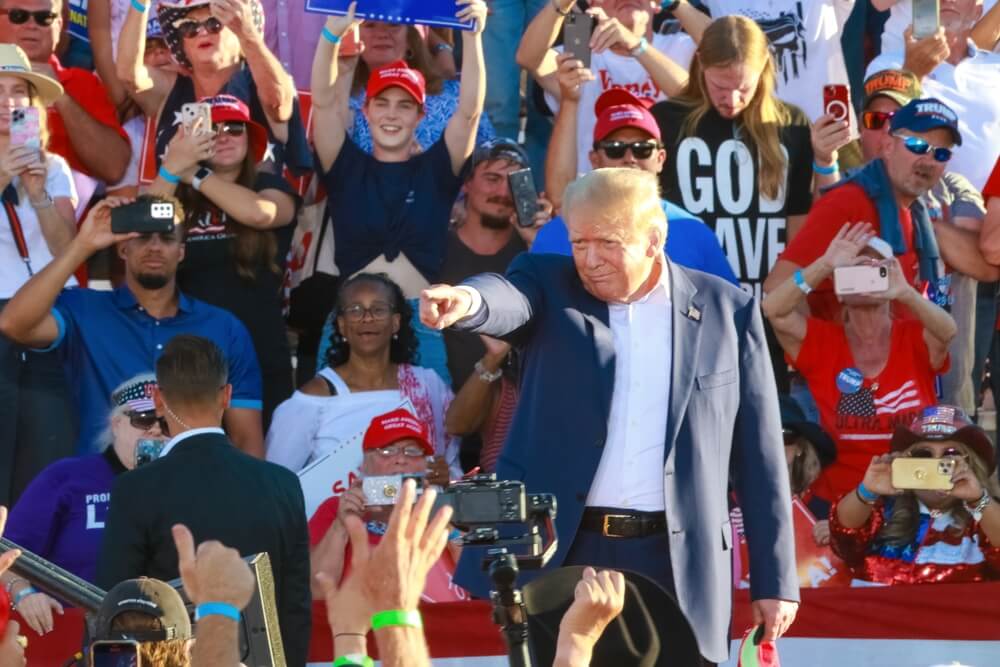Anyone who is ready to underestimate the influence of the TV presidential debate on voter attitudes should bear in mind that the last one, on 28 June, produced the biggest pre-election earthquake the US has seen in decades.
A disastrous performance in a TV debate with Donald Trump has not in itself removed Joe Biden from the presidential race. But if this debate had not taken place, Biden would probably still be the Democratic candidate today rather than his vice president, Kamala Harris.
Both election camps are banking heavily on ABC's Tuesday night duel in Philadelphia, so should their expectations be high?
Based on voter attitudes at the start of September, the debate will not have a major impact. Although as many as three-quarters of registered voters said that they would watch the 90-minute debate, only slightly less than 30% said that it would be very or somewhat important in determining their vote.
Furthermore, almost all decided voters (96% of Kamala Harris' and 95% of Donald Trump's voters) said that they have already decided who they will vote for and that this will not change.
Why the TV debate?
If they are so firmly determined now, two months before the elections, why the TV debate? More specifically, why are the election camps going to such great lengths to prepare their candidates for a traditional TV show, a necessity without which the campaign would be impossible?
We can doubt, to a certain extent, that voters are really firmly convinced of who they will vote for, as they claim today. However, as campaign strategists are well aware, TV debates often leave a lasting impression on voters, potentially influencing their political preferences.
The TV debates greatly shaped the attitudes of voters
A brief history of the presidential elections from 1988 to 2016 confirms that the TV debates greatly shaped the attitudes of voters. In all eight cycles, except for 1996 (Clinton/Dole), about two-thirds of voters said that TV debates were helpful in deciding who to vote for.
If we view the TV showdown between the two presidential candidates as a spectacle that will determine a winner and a loser, without delving deeply into the content of what they say, it appears reasonable that Trump has a greater chance.
Trump's insults against Harris
Disqualifying Kamala Harris, even accompanied by insults, dominates Trump's campaign so far and is clearly paying off, given his still high approval ratings.
In a short TV duel, in which he technically has 45 minutes at his disposal, there will be more space for Trump's verbal attacks on his opponent than for a longer explanation of his policies.
This is a field in which the former president feels comfortable because he has a talent for stage performances but also a strong ego, which he believes has the power to deal strong verbal punches.
Trump's self-confidence and lack of discipline to follow the advice of his strategists pose a significant risk of hurting himself
Trump's self-confidence and lack of discipline to follow the advice of his strategists pose a significant risk of hurting himself in a short TV show and potentially squandering his chance to win over undecided voters, a crucial goal for both parties.
The key mistake that Trump could make in Tuesday's debate is to enter it with a sense of triumph. In the previous showdown with Biden on 28 June, he knocked out his opponent and kicked him out of the race.
The forthcoming debate will bear no resemblance to the one at the end of June. In the meantime, the Democrats have changed their candidate and designed a campaign that suits Kamala Harris. Joe Biden is no longer Trump's opponent, but is Trump really aware of this big change?
Risks for Kamala Harris
Kamala Harris has never met Trump, and she will be in the same room with him for the first time on Tuesday. That could be a handicap for the US Vice President. She has long been under pressure for avoiding the media, thus avoiding questions and discussions with journalists, which creates the perception that she is insecure in defending her policies. Her recent interview with CNN did little to change that impression.
In this respect, the TV debate will not change anything because it limits direct confrontation (the microphones will again be muted while their opponent speaks).
 Trump has consistently undervalued Ms Harris in the past, and he could easily repeat his previous insults
Trump has consistently undervalued Ms Harris in the past, and he could easily repeat his previous insults
The biggest initial advantage for the Democratic Party candidate, however, is precisely that she can choose the approach she will use to face Trump. Whatever she chooses, it will be a surprise for the Republican candidate.
Trump has consistently undervalued Ms Harris in the past, and he could easily repeat his previous insults ("lunatic," "communist," and "garbage") in a TV debate.
Kamala Harris, on the other hand, is at risk of repeating the confusion and evasion of the simplest questions in the debate, which happened to her on CNN when she struggled to answer a simple question: What will she do on day one if she becomes the US president?
All of the issues participants face ahead of Tuesday's debate stem from the perception that the TV debate will not determine the outcome of the election. Together with their election strategists, they manage to hide this perception, but they still have it deep inside them.
The loser on Tuesday will be the candidate who has forgotten more about what happened not so long ago, at the end of June, after the last TV debate.